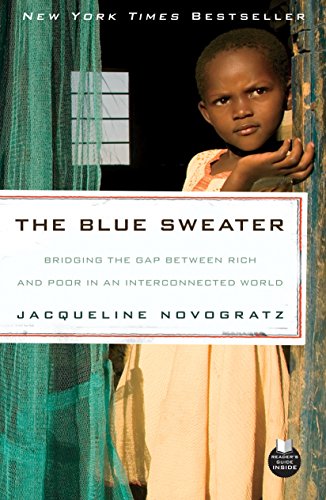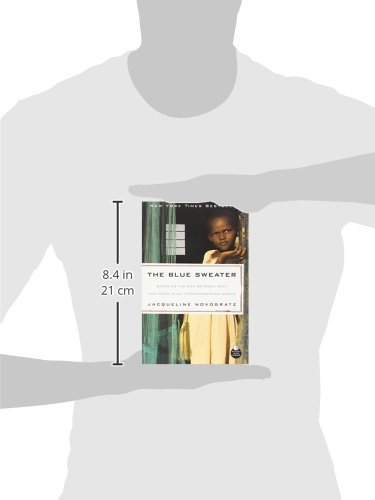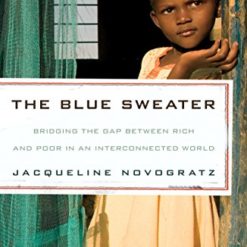Auteur: Novogratz, Jacqueline
Édition: Reprint
Nombre de pages: 320
Éditeur: Rodale Books
Date de sortie: 16-02-2010
Détails: Présentation de l’éditeur The Blue Sweater is the inspiring story of a woman who left a career in international banking to spend her life on a quest to understand global poverty and find powerful new ways of tackling it. It all started back home in Virginia, with the blue sweater, a gift that quickly became her prized possession—until the day she outgrew it and gave it away to Goodwill. Eleven years later in Africa, she spotted a young boy wearing that very sweater, with her name still on the tag inside. That the sweater had made its trek all the way to Rwanda was ample evidence, she thought, of how we are all connected, how our actions—and inaction—touch people every day across the globe, people we may never know or meet. From her first stumbling efforts as a young idealist venturing forth in Africa to the creation of the trailblazing organization she runs today, Novogratz tells gripping stories with unforgettable characters—women dancing in a Nairobi slum, unwed mothers starting a bakery, courageous survivors of the Rwandan genocide, entrepreneurs building services for the poor against impossible odds. She shows, in ways both hilarious and heartbreaking, how traditional charity often fails, but how a new form of philanthropic investing called « patient capital » can help make people self-sufficient and can change millions of lives. More than just an autobiography or a how-to guide to addressing poverty, The Blue Sweater is a call to action that challenges us to grant dignity to the poor and to rethink our engagement with the world. Extrait CHAPTER 1 INNOCENT ABROAD « There is no passion to be found playing small in settling for a life that is less than the one you are capable of living. » –NELSON MANDELA It all started with the blue sweater, the one my uncle Ed gave me. He was like Santa to me, even in the middle of July. Of soft blue wool, with stripes on the sleeves and an African motif across the front–two zebras walking in front of a snowcapped mountain–the sweater made me dream of places far away. I hadn’t heard of Mount Kilimanjaro, nor did I have any idea that Africa would one day find a prominent place in my heart. Still, I loved that sweater and wore it often and everywhere. I wrote my name on the tag to ensure that it would be mine forever. In our neighborhood in Virginia in the 1970s, new clothing was a once- or twice-a-year event. We would shop in September for school and at Christmastime and then make do for the year. As the eldest of seven children, at least I didn’t have to wear many hand-me-downs, and I liked choosing my own clothes; still, I loved that blue sweater. I wore it for years–right through middle school and into my freshman year in high school- -though it started to fit me differently then, hugging adolescent curves I fought mightily to ignore. But then my high school nemesis (who would burn down the school in our senior year by throwing a Molotov cocktail into the principal’s office) ruined everything. At our school, the cool kids and athletes hung out in « Jock Hall, » the area right outside the gym. During football season, the cheerleaders would decorate the hall with crepe paper streamers while the guys strutted around like peacocks in green and gold jerseys. Only a freshman, I was breathless just to be admitted to the scene. One Friday afternoon, the captain of the team had asked me on a date right there in the middle of the hall. The very air seemed to crackle with expectation. And there was that mean kid, standing right beside me, talking to boys from the junior varsity football team about the first ski trip of the winter. He stared at my sweater, and I gave him the coldest look I could muster. « We don’t have to go anywhere to ski, » he yelled, pointing at my chest. « We can do it on Mount Novogratz. » The other boys joined him in laughter. I died a thousand deaths. That afternoon, I marched home and announced to my mother that the vile sweater had to go. How could she have let me walk out of the
Soyez le premier à laisser votre avis sur “The Blue Sweater: Bridging the Gap Between Rich and Poor in an Interconnected World” Annuler la réponse
Vous devez être connecté pour publier un avis.


























Avis
Il n’y a pas encore d’avis.